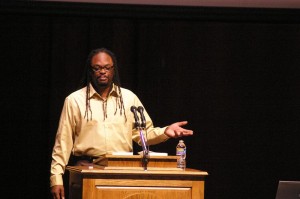To the Editor:
When the seven sorority presidents made a public declaration at an Interfraternity Council meeting vocalizing their discontent with offensive party themes on campus, it was a laudable display of courage on their part to challenge the status quo of the campus climate. On behalf of the 12 fraternity presidents on campus, I would like to congratulate and to express our appreciation towards the sorority presidents for taking this stance, as well as affirm our commitment that fraternities will not perpetuate displays of sexism via offensive party themes at our social events. As Greek men, we have pledged ourselves to adhere to strong values, morals and ethics. We realize that we play an integral role in the shaping of Bucknell’s social culture, and to hold that position in conjunction with allowing sexist, misogynistic and offensive themes for social events to exist is both detrimental to student equality on campus and also a toxic violation to our commitment to higher values and social excellence.
We recognize that there are widespread benefits the Greek community provides for the student body and the campus community at large. Recently,actions taken by our members and chapters are neither reflective of what we, as Greeks, strive to achieve nor compatible with our mission of complementing our academic experience. Eradicating offensive party themes is a necessary initial step that will affect progress and motivate students for further change. But our larger goal moving forward is to distinguish ourselves as a catalyst in the University community that will (1) motivate a departure from the negative realities of our current social scene and (2) cultivate a desire for recapturing a student culture that engenders, espouses and extols the values and beliefs we hold fundamental to our commitment as Greeks. We know that social change does not happen overnight, and there is unfortunate internal resistance we will inevitably encounter. But that does not negate our salient responsibility to help confront the systemic issues of sexual assault, alcohol & drug abuse, uncharacteristic student engagement and other problems that often are associated with Greek-letter organizations. Our ability to initiate this progress is contingent upon the strength of our student leaders to be outspoken, motivated and proactive–all qualities we know exist among us. We are committed to increasing the education about our organizations and to solidifying the axiom that meaningful and purposeful discussion and education throughout our time in our organizations will ameliorate our members’ characters. Reaffirming our values will help refocus our organizations as complementary to our higher education and beneficial for student life. A Greek-letter organization can provide myriad educational opportunities to its members, and it is incumbent upon us to harness this influence, which has too often fallen by the wayside. A true recognition of our principles and values will make us better individuals, better prepared for the reality and the unexpected we will encounter in life after the University.
The sorority presidents have taken a praise-worthy step towards improving our campus culture and as fellow University students, Greeks and peers, we stand strong in supporting them and helping advance their cause. We look forward to working with many student organizations and resources on campus in the future in order to fulfil our goals.
Sincerely,
Michael Higgins
Interfraternity Council President
